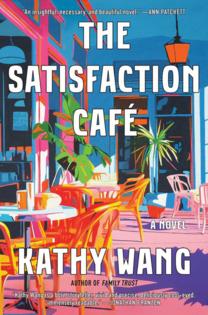Review: Meet a sweet, prickly, funny heroine in 'The Satisfaction Café'
Published in Books News
On “CBS Sunday Morning” recently, novelist Anne Tyler said she’s working on a book but she may never publish again. She might have been joking but, if she wasn’t, a new novel could make fans of the wry, observant author mighty happy.
Even the title of Kathy Wang’s “The Satisfaction Café” sounds like a Tyler title, specifically “Dinner at the Homesick Restaurant,” and both reference a place designed for customers to eat and heal. Like Tyler, Wang believes the tiny details of life are worth attending to, small decisions and events can change lives, everyone is messy and that, even so, the story of an ordinary person can be extraordinarily beautiful.
The ordinary person in “The Satisfaction Café” is Joan, who travels from her native Taiwan to the Bay Area to attend Stanford, marries (twice, but one hardly counts), raises children and dreams of opening the titular bistro. Made to feel like an afterthought by her parents and the family she helps create, Joan is always at center stage for readers in “Satisfaction,” a collection of linked stories that offers the — sorry — satisfaction of a novel.
Sometimes, years elapse in between check-ins with Joan and the other characters, including her philandering husband Bill and children Jamie and Lee. The result is that Wang’s writing is both tightly observed (Wang writes of a relationship with Joan’s sister-in-law that “Bridget now spoke to Joan as if they’d experienced something significant together, like high school or a stressful cruise”) and vast, almost epic. Since the novel’s vignettes cover half a century, collectively they make us feel like we understand exactly how Joan’s thorny mind works.
Not incidentally, Joan might be my favorite literary character since Elizabeth Strout’s Olive Kitteridge. Like Olive, Joan is far from perfect.
One of the first things we see her do is stab her first husband (the one who doesn’t matter; he survives). And, having been driven nuts by her control freak mother, who hangs up the telephone when she’s mad at Joan, eventually Joan does exactly the same thing to her own children. But she’s also smart, forgiving, kind and — especially when Wang lets us in on the observations Joan thinks but chooses not to voice — wickedly funny.
Wang, whose other novels are “Family Trust” and “Impostor Syndrome,” also takes at least one big risk with “Satisfaction.” Despite the fact that it spans 50 years, most of the novel takes place in a sort of constant present, so it feels like we’re there as Joan puts out a series of fires in her volatile family (one of those fires is literal, by the way). But, usually at the end of chapters, the voice slips into omniscient peeks at the future: “Joan would devote a great deal of herself to this question; it would become one of her life’s obsessions.”
The device is similar to the one in “The White Lotus,” where the first episode foreshadows something that will happen, so we concentrate even harder on situations that seem to be leading us to that event. Wang doesn’t use this device for suspense — we all know the arc any human’s life must take, so the ending of “The Satisfaction Café” isn’t exactly a surprise. Instead, the looks ahead situate each small event in Joan’s journey as part of the larger picture of who she is.
The effect is that Wang’s short, graceful chapters are like brushstrokes, and Joan is the resulting work of art.
____
The Satisfaction Cafe
By: Kathy Wang.
Publisher: Scribner, 338 pages.
©2025 The Minnesota Star Tribune. Visit at startribune.com. Distributed by Tribune Content Agency, LLC.













Comments